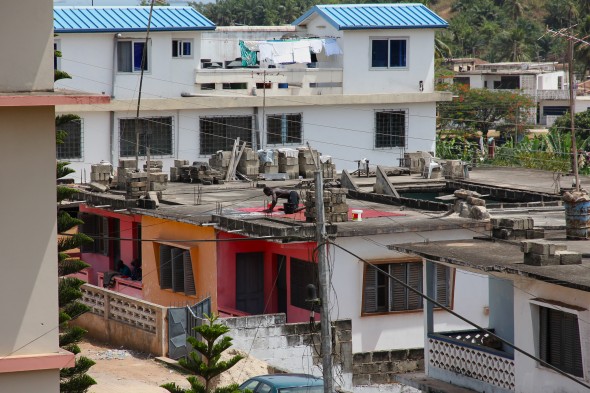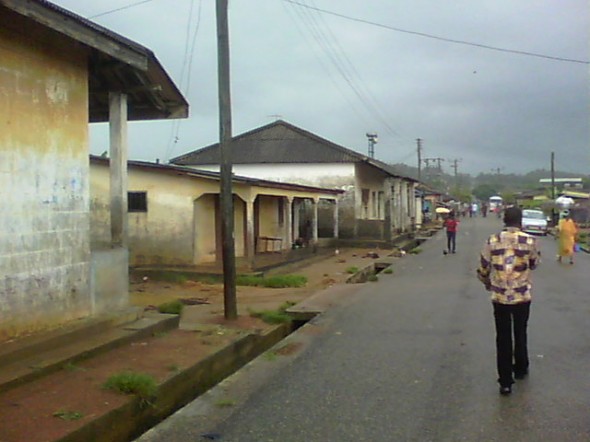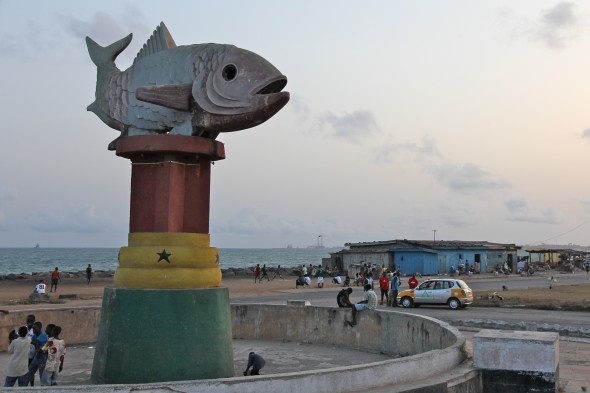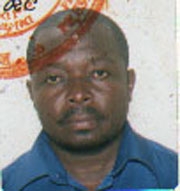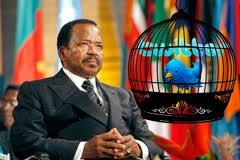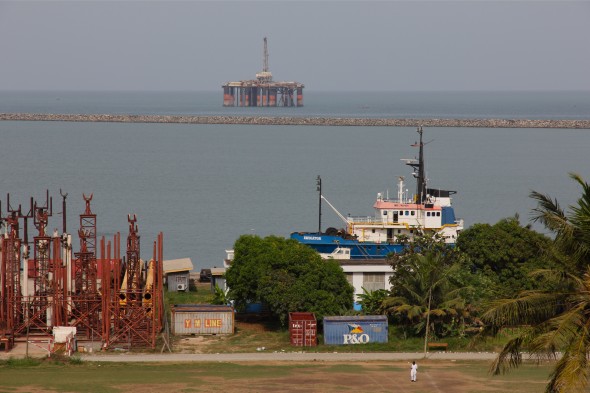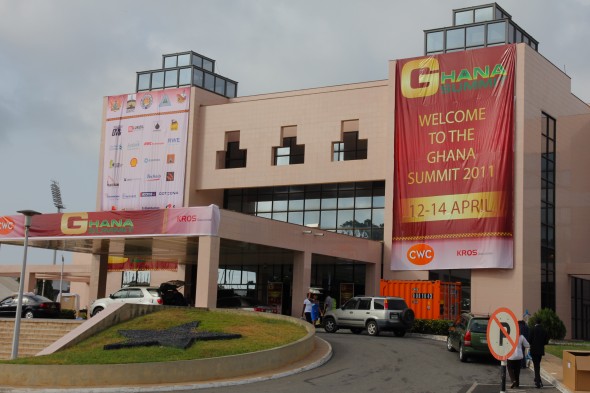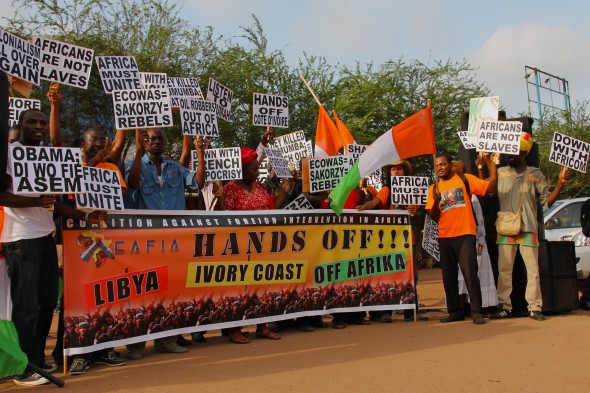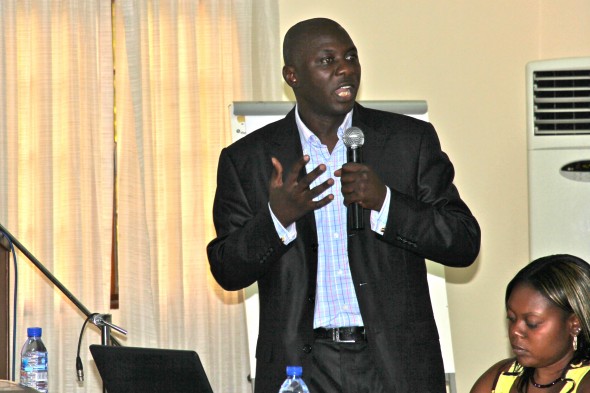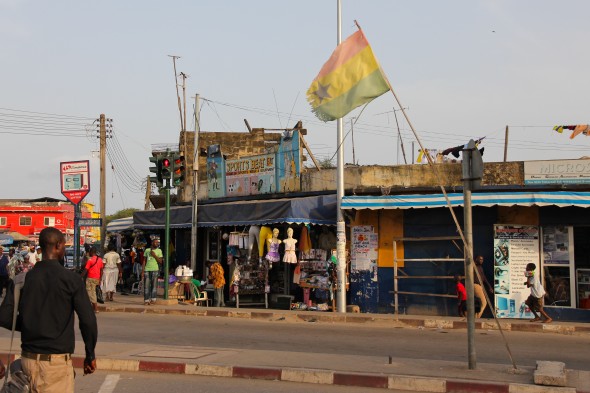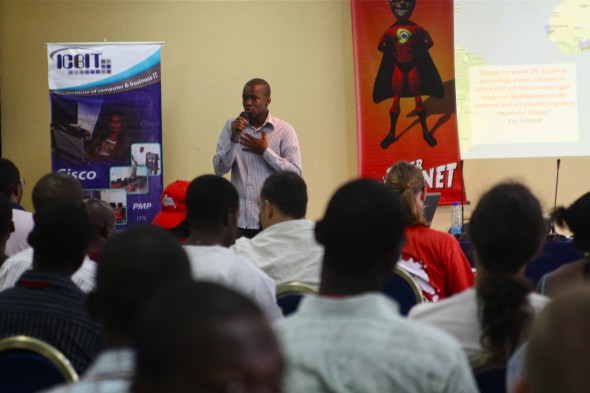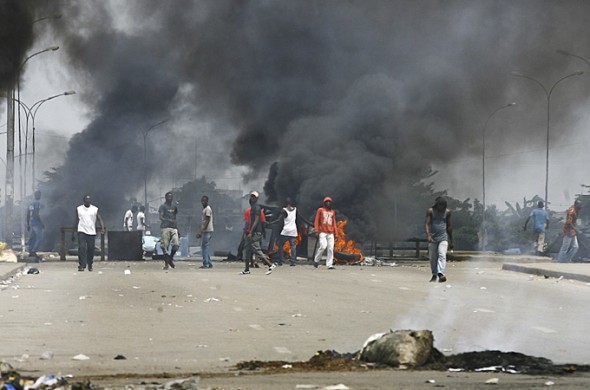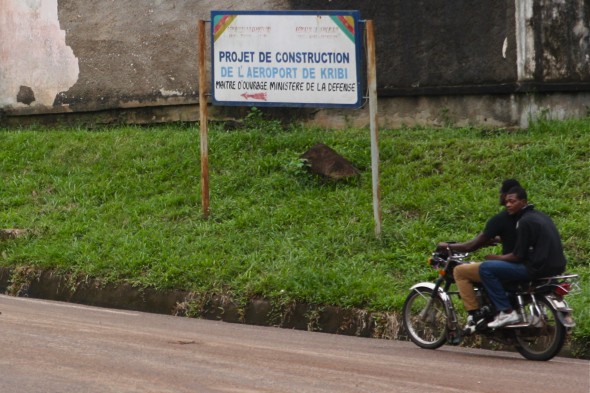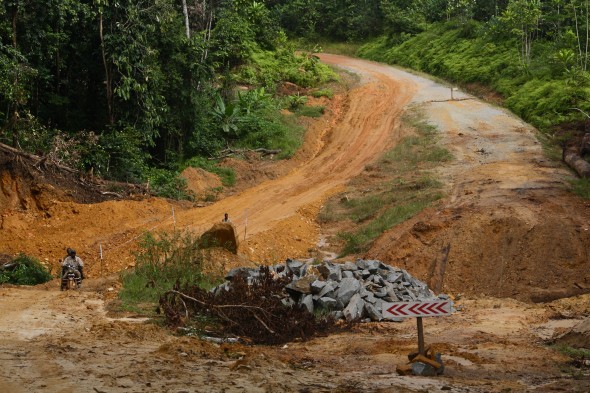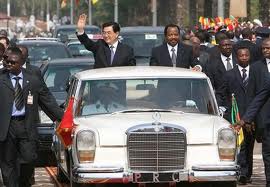Oil and Beyond: Ghana looks to retool its economy
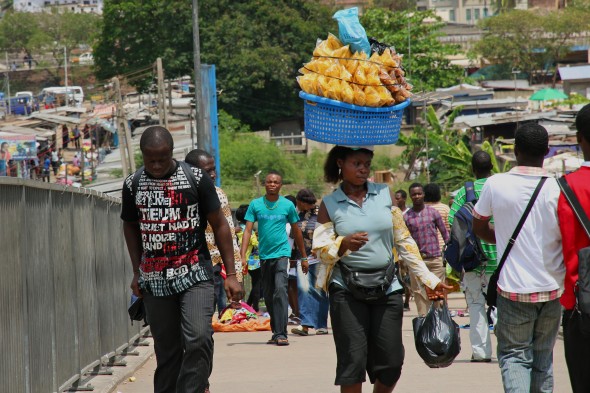
Accra. Will Ghana's oil wealth translate into improved lives for Ghanaians? Photo by Christiane Badgley
Now that Ghana has become a middle-income country, the West African nation is taking stock of the many challenges it faces, including uneven development. Authorities are consulting with experts at home and abroad on how to ensure that oil revenues benefit all Ghanaians in a sustainable manner.
Oil is not enough: Africa needs industrial development
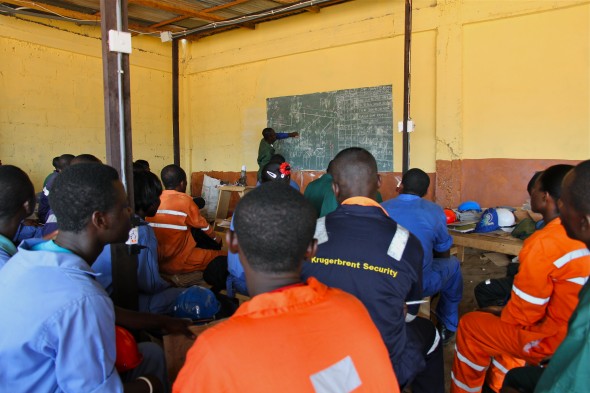
When industrial development arrives in Sekondi-Takoradi, there will be a trained workforce ready for employment. Photo by Christiane Badgley
This morning I came across an article in the Guardian, Africa must build industrial sector urgently, warns UN agency, and the timing could not be better. I’m in Guangzhou, China, marketplace for the world, and if you ever needed a reminder that manufacturing is what creates jobs and wealth and leads to real economic development, come here and look around.
Can Ghana benefit from Norway’s oil experience?
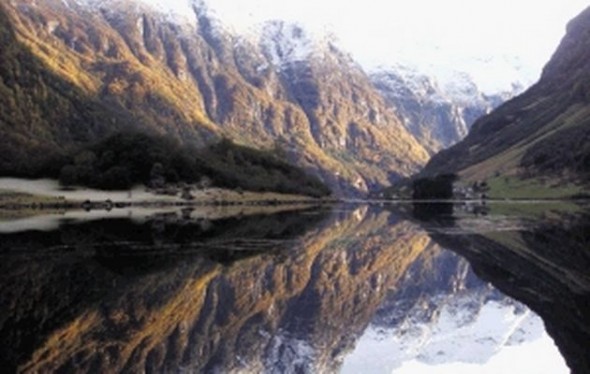
Iraqi-born geologist Farouk al-Kasim predicted Norway's big oil find and is one of the pioneers of the country's oil policy. Photo: Sunday Times, South Africa
There’s a lot of talk in Ghana about Norway, the country that has made oil work for its citizens. Ghana is looking to the Norwegian experience for insights into how best to manage its oil resources. The Norwegian Agency for Development Cooperation has an Oil for Development Program in Ghana that seeks to develop long-term institutional cooperation in the oil sector. Through this program, the Norwegian government is providing assistance in competence and capacity building within resource management, revenue management and environmental management.
Africa’s economy rebounds without jobs
What happens when an economy grows rapidly without generating jobs?
Yesterday I was talking about Ghana’s economy with a Ghanaian who is doing business in Hong Kong. On paper things are booming:
Ghana’s economic growth accelerated to an annual 23 percent in the first quarter as the West African nation began producing oil for export, the country’s statistics agency said….Expansion was led by a 162 percent jump in mining and quarrying, which includes the oil industry, while agriculture grew 39.2 percent. Ghana began production of oil from its offshore Jubilee field in December. Output is about 70,000 barrels a day and may climb to 120,000 next month, according to the field’s operator, London-based Tullow Oil Plc.
Jubilee’s oil…Bonyere’s gas: what’s going on?
Today I’m posting an article by Stephen Yeboah on the proposed Bonyere gas project. Yeboah, a Ghanaian development practitioner who focuses on the extractive industries, recently participated in a training program on oil and gas reporting funded by Revenue Watch Institute, Thomson Reuters Foundation and the International Institute of ICT Journalism (Penplusbytes).
First some background:
The Jubilee oil development project includes plans to pipe the gas released by the drilling to shore where it will be processed to generate electricity and eventually lead to further industrial development.
Standing up for E.G.: We just need some more time
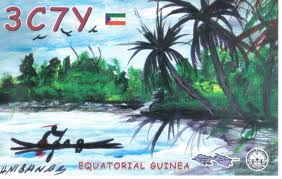 Anatolio Ndong Mba, Ambassador to the United Nations for Equatorial Guinea, recently wrote a letter to The New York Times in response to a critical article in the May 31st edition of the paper. Here’s his letter:
Anatolio Ndong Mba, Ambassador to the United Nations for Equatorial Guinea, recently wrote a letter to The New York Times in response to a critical article in the May 31st edition of the paper. Here’s his letter:
To the Editor:
“An Iron Grip in Africa, With Ties to the U.S.” (Malabo Journal, May 31) presents an unrealistic and outdated image of Equatorial Guinea, a country that is struggling vigorously to become more free, to modernize itself and to provide a better standard of living for its citizens.
New video online!
The Center for Public Integrity and the Pulitzer Center have posted the first of my short video dispatches on Ghana’s new oil industry: http://www.iwatchnews.org/2011/06/10/4859/fishing-and-offshore-oil-industry-delicate-imbalance
There’s a dedicated “Oil City Stories” page at the Pulitzer Center and from there you can access articles and videos: http://pulitzercenter.org/projects/ghana-oil-city-hopes-challenges-takoradi
Please visit these pages and add comments, tweet, like, share, etc.! Increased traffic and comments help me convince funders to continue supporting this work. New videos will be out soon and we’re working on a longer film project. It’s crucial to keep up the momentum!
Thanks for your interest and support.
Oil City Stories at the Pulitzer Center!

Sekondi-Takoradi, Ghana's "Oil City." The giant fish monument at the Sekondi beachfront roundabout is a testament to the importance of fishing for this town. It seems fitting that the fish appears to be gasping for breath as overfishing and now the oil industry take their toll on local livelihoods. Photo by Christiane Badgley
The Pulitzer Center on Crisis Reporting has launched a project page for Oil City Stories, my work in Ghana. Please visit the page, subscribe, like it on facebook and retweet! I need people who care about these issues to make their voices heard — getting the word out helps me secure the funding I need to continue this work.
I haven’t been posting much the past few days as I’m editing photos and videos. Starting in a few days the videos will go up on the websites of The Center for Public Integrity and The Pulitzer Center, my partners on the Ghana work.
With these videos, I give voice to people and concerns rarely heard in U.S./Western media coverage of the oil industry in Africa. We read about the oil industry in the business pages (or in articles focused on the business side of things) and then we read about MEND operations in the Niger Delta. We rarely hear anything about what happens between the signing of lucrative deals and the rebellions, yet if we want to understand (and avoid) the so-called “resource curse” this is where we need to focus our attention.
Between — it’s where things happen and it’s where I’m working. Stay tuned and please spread the word!
Gulf of Guinea: The new Wild West
Reuters ran a story several months ago on the key political risks of doing business in the Gulf of Guinea.
I posted the article then. The article has been updated and I’m putting it up once again. As I said when I originally posted this article, most coverage of the extractive industries (and cocoa, in the case of this article) is in the business pages and basically boils down to dollars and cents. What are the rewards, what are the risks?
The human side of the story is only of interest insofar as it impacts business and the investment climate. Ditto for the environment. What’s noteworthy here is that there is absolutely no mention of the the environmental risk of rapidly expanding drilling and mining. Kind of crazy when you consider that environmental mayhem will certainly lead to social unrest. Even from an investment perspective, one might think (wish?) that environmental concerns would be part of the risk assessment.
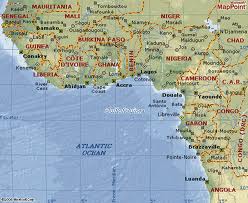 DAKAR May 3 (Reuters) – A stretch of West Africa’s coast spanning more than a dozen countries, the Gulf of Guinea is a growing source of oil, cocoa and metals to world markets.
DAKAR May 3 (Reuters) – A stretch of West Africa’s coast spanning more than a dozen countries, the Gulf of Guinea is a growing source of oil, cocoa and metals to world markets.
But rising rates of piracy, drug smuggling, and political uncertainty in an area ravaged by civil wars and coups have made it a challenging destination for investors seeking to benefit from the massive resources.
The Gulf of Guinea runs from Guinea on Africa’s northwestern tip to Angola in the south and includes Nigeria, Ghana, Ivory Coast, Democratic Republic of Congo, and Cameroon.
Committee to Protect Journalists calls for justice in Cameroon
One year ago, Cameroonian journalist Germain Cyrille “Bibi” Ngota Ngota died in his Kondengui Prison cell. Denied medical attention, Ngota’s death was murder by abandonment (the government denied this allegation and “proved” through its own inquiry that Ngota died due to his poor health). The Committee to Protect Journalists (CPJ) spoke out at the time and, one year later, is again demanding justice and reform.
Deepwater Horizon: Can it happen again?
I interviewed the Ghanaian EPA’s “focal person for oil and gas” Friday afternoon in Takoradi.
I asked him about the Deepwater Horizon disaster and what Ghanaian authorities believe necessary to reduce the chances of a similar event occurring here. I wanted to hear about policy directives and stepped-up enforcement of existing laws, for example. Instead, I heard that the Deepwater Horizon accident was “unique” and that something like it “could never happen in Ghana.”
Between the cheerful confidence of the EPA official and the “we’ve got safety under control” assurances of speakers at the Ghana summit, you could be forgiven for thinking that things have dramatically changed in the last year. Things have changed, but unfortunately it appears that too much remains the same.
The Ghana Summit 2011
The oil and gas industry trade show rolled into town this week. For three days conference delegates sat through strategy sessions, chatted with exhibitors and attended networking coffee sessions, lunches, gala cocktail parties and dinners. The halls of the Accra conference center were filled with exhibitors stands: from Tullow Oil, lead partner in Ghana’s Jubilee Field, to distributors of work boots and catering services, everyone wanting in on Ghana’s oil business was here.
Hands off Africa!
That was the message in the streets of Accra on April 12th.
As the French TV coverage of the event put it, “people in many African countries, including Ghana, do not approve of the French action in Ivory Coast.”
Report card: Ghana oil gets a “C”
The report card is out and Ghana’s overall grade is a “C.”
The government (executive branch), the parliament, the donor partners, the oil and gas companies and civil society all received average grades of “C” (fair). As Mohammed Amin Adam, National Coordinator of the Civil Society Platform, explained, the objectives of the readiness report and the accompanying report card are to acknowledge progress made to date and to encourage renewed efforts moving forward. That’s why, according to Amin, the grading system was fairly easy.
Oil City: Where are the Jobs, pt. 2
“Oil City,” Ghana’s new Wild West. There may not be many oil industry jobs here for the moment, but the fortune seekers, schemers and scammers have arrived and there’s snake oil for sale on every corner.
Here’s part of one email I recently received (I’ve removed names and numbers):
I was offered a vacancy by an engineer whom does recruiting for jubilee oil rig (tel +233-xxx-xxx-xxx Mr. xxxxx) he told me to obtain visa etc we had to pay in 490 us dollars via western union and that he would get back to me he now is asking for a further 1699 us dollars for some documentation levy payable to Ghana Maritime labour law it is for the certification of employment and travel documents under GMA prior before delivery as a new employee joining the Ghana jubilee oil field.
Africa’s Missing Money
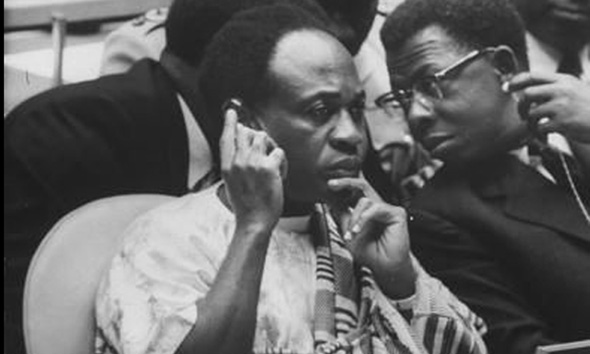
"The danger to world peace springs not from the action of those who seek to end neo-colonialism but from the inaction of those who allow it to continue." Kwame Nkrumah, Neo-Colonialism, p. 259
Next time you read about some corrupt African leader looting his country, lining the pockets of his cronies, stashing millions in Swiss bank accounts, buying villas in Paris and penthouse apartments in New York, setting up his playboy son to run some excessively lucrative state enterprise or another while the people of said country live in abject poverty, hold your reaction. Before you sigh and bemoan Africa’s cultures of corruption, callous despots, and managerial ineptitude, stop and ask yourself what’s missing from the picture. Continue reading . . .
Ghana dreaming…
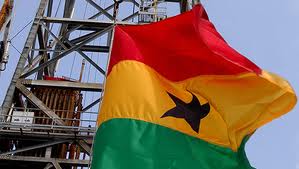 “Ghana dreaming. That’s what you should call your story.” On a packed flight to Accra, I ended up by chance seated next to an American oil and gas professional who has been living in Ghana and working throughout the Gulf of Guinea for the past 15 years. We started chatting and I told him I was going to Ghana to report on the country’s new oil industry.
“Ghana dreaming. That’s what you should call your story.” On a packed flight to Accra, I ended up by chance seated next to an American oil and gas professional who has been living in Ghana and working throughout the Gulf of Guinea for the past 15 years. We started chatting and I told him I was going to Ghana to report on the country’s new oil industry.
He wasn’t at all excited about Ghana’s entry into the petroleum club. This man looks at the oil industry in terms of job prospects and for him Ghana’s Jubilee field is a bust.
As he explained to me, deepwater drilling is a highly specialized operation; the equipment and materials arrive from outside the country, are installed by specialized expat crews and then provide virtually no business for local maintenance companies or jobs for oil workers.
For this freelance operator the idea that Ghana’s oil industry is going to create a business boom is no more than a pipe dream. Continue reading . . .
In search of an African revolution
Many are wondering if the popular uprisings across North Africa will spread south. I’ve posted some thoughts and articles about what may help or hinder peoples’ protests south of the Sahara. I read this article on the Al Jazeera English website. It highlights the role of the media and I thought it was worth reposting.
International media is following protests across the ‘Arab world’ but ignoring those in Africa.
by Azad Essa Last Modified: 21 Feb 2011 16:24 GMT Continue reading . . .
African Democracy and Oil: A Combustible Mix
Oil and democracy: do they mix?
A few days ago in his FiveThirtyEight blog, Nate Silver considered Egypt, Oil and Democracy:
There is a large body of literature in political science connecting oil wealth and democratization. Although the conclusions are not universally accepted and there are some exceptions — Norway, for instance, is one of the most petroleum-rich countries in the world, and also one of the most democratic — the consensus view is toward what Thomas L. Friedman refers to as The First Law of Petropolitics: oil and democracy do not mix.
He then pointed to data from 21 Middle Eastern and North African countries, which showed an inverse relationship between democracy and resource wealth. In other words, the more oil a country has, the less likely it is to be democratic. Continue reading . . .
Key political risks in the Gulf of Guinea
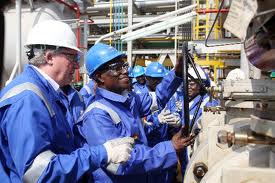
Ghanaian President John Atta Mills (second right) turns the valve to flag off first oil production at FPSO Kwame Nkrumah oil rig at the Jubilee field in Takoradi after flagging off production of oil on December 15, 2010. The country has raised its pump prices. AFP | AFRICA REVIEW |
Business news from Reuters. The Gulf of Guinea tempts investors, but the terrain is not without risk. I love business news — everything boils down to dollars and cents and risks are just part of doing business. Go somewhere else to find out why the area is so volatile. Maybe has something to do with all those profits that never seem to benefit local communities.
I’m reprinting this article nonetheless, because it is a snapshot of the region and what to watch for in the coming months. One note: The article mentions Ivory Coast and “political uncertainty”, but does not bring up the regional political calendar. This is an election year across much of the Gulf of Guinea and events in the Ivory Coast, Tunisia and Egypt may very well have repercussions on regional politics. (Consider Gabon, where demonstrators have been brandishing signs calling for President Ali Bongo to leave.)
Feb 1 (Reuters) – A stretch of West Africa’s coast spanning more than a dozen countries, the Gulf of Guinea is a growing source of oil, cocoa and metals to world markets.
But rising rates of piracy, drug smuggling, and political uncertainty in an area ravaged by civil wars and coups have made it a challenging destination for investors seeking to benefit from the massive resources.
The Gulf of Guinea runs from Guinea on Africa’s northwestern tip to Gabon in the south and includes Nigeria, Ghana, Ivory Coast, Democratic Republic of Congo, and Cameroon.
NEW ENERGY FRONTIER?
Gulf of Guinea nations produce more than 3 million barrels of oil per day — about 4 percent of the global total — mostly for European and American markets, with the bulk coming from OPEC-member Nigeria (2.2 million bpd).
Smaller producers include Equatorial Guinea (300,000 bpd), Congo Republic (340,000 bpd), Gabon (230,000 bpd), Cameroon (66,000 bpd) and Ivory Coast (40,000 bpd).
While many of the region’s producers are struggling to maintain output, oil companies believe the deep seas along the coast west of Nigeria could be a new frontier.
Ghana joined the ranks of West African oil producers in December and is expected to ramp up output to 150,000 bpd in the coming months. Further out, Sierra Leone and Liberia hope offshore drilling will spell oil riches for them as well.
Washington estimates the Gulf of Guinea will supply about a quarter of U.S. oil by 2015 and has sent military trainers to the region to help local navies secure shipping.
What to watch:
Election Year Flurry of Public Works (announcements)
Bridges, dams, hydroelectric plants, roads and railways! In Cameroon every day seems to bring another announcement of an ambitious, much-needed and long-overdue public works project. Before long the country will be buzzing with activity and from Kribi to Douala, Limbe, Yaounde and beyond, Cameroon will be on the fast track to development, heading for middle income status by 2035 (You can download the government working paper, Cameroon Vision 2035, or read about it at African Economic Outlook).
The Chinese, the French, the Americans and the World Bank are all announcing projects and loan packages for infrastructure and industry — certainly many lucrative deals are on the horizon. There’s just one catch, though. This is Cameroon and it’s an election year.
All sorts of promises get made during an election year — that’s politics everywhere, I imagine. But Cameroonians have watched their president make hollow promises for decades. Drive along any road and you’ll see signs announcing public works projects. Sometimes the signs indicate the duration of the work, “36 months”, but don’t include a start- or end-date. Or you’ll see a start-date, but nothing else. Either way, it’s often a sign next to nothing or next to a pile of rubble that looks like it’s been there, untouched, for months. So, understandably any announcement today will likely be perceived as nothing more than “effet d’annonce” (hype).
Will the Chinese use the Chad-Cameroon pipeline?
I just stumbled across an interesting bit of news. China and ExxonMobil may do business together in Chad. I said, “may,” not “will,” but this could be a significant development.
It is fascinating the way information about the Chad-Cameroon pipeline is revealed. It’s really difficult to get interviews with government or oil company officials. I’ve tried off and on for months, to no avail. So for some information I watch what comes through the (state-run) press. Nothing is straightforward. Items often appear about events that occurred months earlier, for seemingly no reason, but sometimes interesting little nuggets of information are mentioned in passing.
If you’re not paying attention, they are easily overlooked. For example, a few days ago, the Cameroon Tribune (government publication) ran an article about the pipeline with the headline, “36.75 million barrels of oil and 7.6 billion Francs” (That’s about US$ 17 million.)
The article, basically highlights from the October 2010 Pipeline Steering and Monitoring Committee report, began with details on the quantity of oil that had transited across Cameroon during the first ten months of 2010, along with information on the transit fees. Apparently less oil was pumped in 2010 than in 2009. Okay. Chances are if you weren’t following the pipeline story you wouldn’t even read beyond the headline.
Yet, several paragraphs down, the article contained some intriguing information.
Thinking about offshore drilling
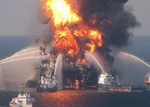 This morning I read Investigation into BP Spill Reveals Incompetence, Greed, Complacency and Cynicism — It’s Time for a New Energy Policy, by Michael Brune, Executive Director of the Sierra Club. The brief article discusses, Deep Water: The Gulf Oil Disaster and the Future of Offshore Drilling, the final report from the Obama-appointed investigative commission. Although the report and its recommendations concern the U.S., it is easy to see the significance for Africa, where oil offshore drilling is on the rise.
This morning I read Investigation into BP Spill Reveals Incompetence, Greed, Complacency and Cynicism — It’s Time for a New Energy Policy, by Michael Brune, Executive Director of the Sierra Club. The brief article discusses, Deep Water: The Gulf Oil Disaster and the Future of Offshore Drilling, the final report from the Obama-appointed investigative commission. Although the report and its recommendations concern the U.S., it is easy to see the significance for Africa, where oil offshore drilling is on the rise.
I’ve recently posted information about the Scottish company, Bowleven, and its new oil finds off the coast of Cameroon. This is no small story: exploration over the past few months indicates that these discoveries are even more promising than initially thought. And Cameroon is not alone. There are new finds in Nigeria. Ghana is now pumping offshore oil. From Sierra Leone to Angola, the entire Gulf of Guinea region is poised for major, new offshore development. Africa, and in particular the Gulf of Guinea, is one of the new oil “hot spots” attracting both the major oil companies (American, European, Chinese and Brazilian) and the “minnows” or “wildcats,” the smaller, independent companies who used to “explore-discover-sell,” but are now getting in on the drilling action, too. Spend a few minutes reading the trade papers and you’ll quickly get a sense that this is the new Wild West.
There’s money, and lots of it, to be made offshore. I remember reading once that the oil business in Equatorial Guinea worked well for the Americans. With all the activity offshore, work crews could be helicoptered in every few weeks. No need to get too close to the abysmal situation on the ground in the country. Oil money fuels the corruption, repression, income inequality and political instability in the country, but the offshore drilling continues without a hitch.
So far, at least. What we hear little about are the environmental risks and dangerous lack of regulation, oversight and response capability that are unfortunately the norm for much of the offshore drilling in the Gulf of Guinea. As I mentioned in a post several weeks ago, I’m looking into the oil spill response plans of Cameroon and other countries in the region. I have yet to see anything reassuring.
More to follow.

